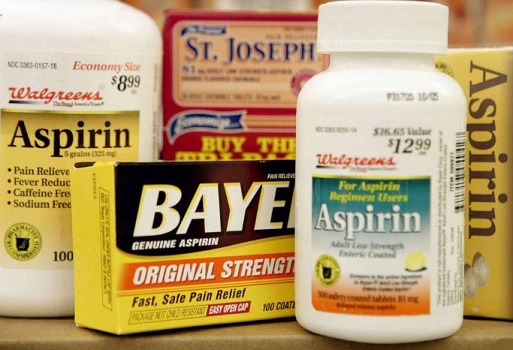Korean study shows that low dose aspirin does not help in heart disease prevention
Nikhil Prasad Fact checked by:Thailand Medical News Team Jul 22, 2024 1 year, 4 months, 3 weeks, 6 days, 4 hours, 59 minutes ago
Cardiology Updates: In an era where cardiovascular health is a pressing concern, researchers have embarked on an extensive study to determine whether low-dose aspirin can effectively prevent heart attacks and strokes. This
Cardiology Updates news report delves into a comprehensive nationwide study that provides new insights into the use of aspirin for preventing these serious health events.
 Korean study shows that low dose aspirin does not help in heart disease prevention
The Study's Objective and Background
Korean study shows that low dose aspirin does not help in heart disease prevention
The Study's Objective and Background
The study involved a large-scale analysis using data from the National Health Insurance Service in South Korea. The researchers aimed to assess the impact of low-dose aspirin on preventing heart attacks and strokes among Koreans. This study is significant because previous research predominantly focused on populations in Western countries, leaving a gap in understanding the effects on Asian populations.
Who Conducted the Study?
This groundbreaking research was carried out by a team of experts from various institutions:
-Dr -Ki-Hong Kim from the Division of Cardiology, Konyang University Hospital, Daejeon, Republic of Korea.
-Dr Inseok Ko and Dr Jong-Yeup Kim from the Department of Biomedical Informatics, College of Medicine, Konyang University, Daejeon, Republic of Korea.
-Dr Dong-Kyu Kim from the Division of Big Data and Artificial Intelligence, Department of Otorhinolaryngology - Head and Neck Surgery, Chuncheon Sacred Heart Hospital, Hallym University College of Medicine, Chuncheon, Republic of Korea.
Study Design and Methodology
The researchers utilized a retrospective cohort study design, analyzing data from the National Sample Cohort dataset, which includes a representative sample of the South Korean population. The study spanned nine years, from 2004 to 2013, and involved 1,106,580 individuals eligible in 2004. Out of these, 200 individuals who consistently received low-dose aspirin (100 mg or less) were selected for the aspirin cohort, while another 200 individuals who did not use aspirin were included in the control group through propensity score matching.
The primary endpoints of the study were the incidences of acute myocardial infarction (heart attack), cerebral infarction (stroke), gastrointestinal hemorrhage (bleeding in the digestive tract), and cerebral hemorrhage (bleeding in the brain).
Key Findings and Insights
-No Significant Difference in Heart Attack and Stroke Rates
One of the most crucial findings of the study is that there was no significant difference in the incidence rates of acute myocardial infarction or cerebral infarction between the aspirin and non-aspirin groups. Specifically, the incidence rate of heart attacks was 3.2 per 1000 person-years in the aspirin cohort, compared to 2.8 per 1000 person-years in the non-aspirin cohort. Similarly, the incidence rate of
strokes was 9.2 per 1000 person-years in the aspirin cohort, compared to 8.0 per 1000 person-years in the non-aspirin cohort.
-Gastrointestinal and Cerebral Hemorrhage Risks
Another critical aspect explored in this study was the risk of major bleeding events. The incidence of gastrointestinal bleeding was found to be slightly lower in the aspirin group (9.0 events per 1000 person-years) compared to the non-aspirin group (11.6 events per 1000 person-years). For cerebral hemorrhage, the incidence was also slightly lower in the aspirin group (1.6 events per 1000 person-years) compared to the non-aspirin group (2.2 events per 1000 person-years).
These findings suggest that the long-term use of low-dose aspirin does not significantly increase the risk of major bleeding events, contrary to some concerns raised by previous studies.
Implications for Diabetic Patients
A subgroup analysis was conducted on diabetic patients, revealing no significant differences in the incidence of heart attacks, strokes, gastrointestinal bleeding, or cerebral hemorrhage between the aspirin and non-aspirin groups. This finding is particularly important for diabetic patients, who are often considered at higher risk for cardiovascular events.
Discussion and Recommendations
The findings of this study add to the growing body of evidence questioning the widespread use of aspirin for primary prevention of cardiovascular events. While aspirin is well-established for secondary prevention (preventing recurrent events in those who have already had a heart attack or stroke), its role in primary prevention (preventing the first occurrence) remains contentious.
The American Heart Association and the American College of Cardiology currently recommend low-dose aspirin for primary prevention in select high-risk individuals aged 40-70 years who are not at increased risk of bleeding. However, this study underscores the need for personalized medical advice, considering individual risk factors and potential benefits versus risks.
Conclusion
In conclusion, the study found no significant reduction in heart attacks or strokes with long-term low-dose aspirin use among Koreans. Moreover, the risk of major bleeding events did not appear to be increased. These findings suggest that aspirin for primary prevention should be used cautiously and tailored to the individual’s baseline cardiovascular risk.
The study findings were published in the peer-reviewed journal: Clinical Practice.
https://www.mdpi.com/2039-7283/14/4/113
For the latest
Cardiology Updates, keep on logging to Thailand Medical News.
Read Also:
https://www.thailandmedical.news/news/long-term,-daily-low-dose-aspirin-intake-does-not-prevent-incidence-of-stroke,-instead-increases-risk-of-intracerebral-bleeding-in-older-adults-by-38-
https://www.thailandmedical.news/news/study-shows-that-use-of-antithrombotics-such-as-aspirin-and-apixaban-does-not-help-non-hospitalized-covid-19-patients-with-mild-or-moderate-symptoms
